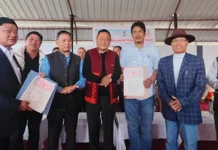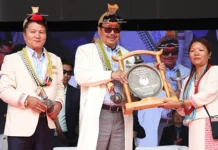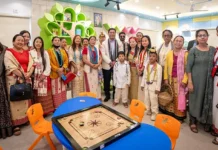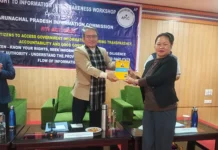NEW DELHI, 29 Jun: The Centre has asked states and union territories to make any proposed changes in the boundaries of administrative units before 31 December, when they will be considered final for the census exercise.
In a letter to all states and union territories, Registrar General and Census Commissioner of India Mritunjay Kumar Narayan said that for the census, all villages and towns are divided into uniform enumeration blocks and for each block an enumerator is assigned to avoid any miss or repetition during the population count.
According to norms, the census can be conducted only three months after the freezing of boundary limits of administrative units such as districts, sub-districts, tehsils, talukas and police stations.
Narayan said that from 1 April, 2026, the houselisting operation, the appointment of supervisors and enumerators and the work division among them will be done, and on 1 February, 2027, the census of the population will begin.
It is important that once enumeration blocks are finalised, boundaries of administrative units are not changed, the letter said.
In his letter addressed to chief secretaries, Narayan asked them to direct all departments to make any proposed changes in the boundaries of municipal corporations, revenue villages, tehsils, subdivisions or districts before 31 December.
He asked the states and UTs to ensure that no changes should be made in the boundaries of administrative units between 1 January, 2026, and 31 March, 2027, during which census exercise will take place.
Any changes in the existing boundaries must be intimated to Census Directorates in the states and union territories and the registrar general of India by 31 December, 2025, it said.
“For census 2027, boundaries of administrative units will be frozen on 31 December, 2025,” the letter said.
To ensure a fair workload for enumerators, an administrative unit is divided into manageable sections for the census, called ‘blocks’.
A block is a clearly defined area within a village or town on a notional map for census purposes.
These are termed houselisting blocks (HLB) during houselisting operations and enumeration blocks (EBs) during population enumeration and serve as the smallest administrative units for the census.
India’s 16th census with caste enumeration will be carried out in 2027 with the reference date of 1 October, 2026, in snow-bound areas like Ladakh and 1 March, 2027, in the rest of the country.
The census will be conducted in two phases. In phase one, ie, houselisting operation (HLO), the housing conditions, assets and amenities of each household will be collected.
Subsequently, in the second phase, ie, population enumeration (PE), the demographic, socioeconomic, cultural and other details of every person in each household will be collected.
In the census, caste enumeration will also be done, a government statement had said.
For census activities, about 34 lakh enumerators and supervisors and around 1.3 lakh census functionaries would be deployed.
It is the 16th census till now and the eighth after independence.
The census will be conducted through digital means using mobile applications. Provision of self-enumeration would also be made available to the people.
Very stringent data security measures would be kept in place to ensure data security at the time of collection, transmission and storage, the statement had said.
The reference date for population census – 2027 will be 00:00 hours of the first day of March 2027. For the union territory of Ladakh and the non-synchronous snow-bound areas of the UT of Jammu and Kashmir and states of Himachal Pradesh and Uttarakhand, the reference date will be 00.00 hours of the first day of October 2026, a notification had said.
This census will be carried out after 16 years as the last one was done in 2011. (PTI)




